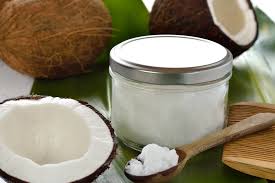
.webp)
.webp)
.webp)
Health Benefits of Coconut Oil: What Science Really Says
.webp)
.webp)
Coconut oil is one of the most popular oils used in wellness, cooking, and beauty routines today. Extracted from the meat of mature coconuts, it’s valued for its rich texture and versatile uses.
.webp)
.webp)
.webp)
Unlike many oils that remain liquid, coconut oil is solid at room temperature. This makes it ideal for many cosmetic and culinary applications.
.webp)
.webp)
But coconut oil is also surrounded by debate. Some praise it as a superfood. Others warn about its high saturated fat content and its possible link to heart disease.
.webp)
.webp)
.webp)
So what’s the truth? Let’s explore the proven health benefits, the potential risks, and how to use coconut oil wisely in your lifestyle.
.webp)
.webp)
1. Coconut Oil and Weight Management
.webp)
.webp)
.webp)
Many believe coconut oil can support weight loss. That idea comes from its unique fat profile, which includes a high concentration of medium-chain triglycerides (MCTs).
.webp)
.webp)
MCTs are processed differently by the body than long-chain fats. They’re absorbed quickly and sent to the liver, where they may be used for energy instead of stored as fat.
.webp)
.webp)
.webp)
In fact, about 65% of the fats in coconut oil are MCTs. This has prompted researchers to study whether coconut oil may mimic some of the metabolic effects of pure MCT oil.
.webp)
.webp)
One study showed that participants taking coconut oil saw a small but statistically significant reduction in body weight, BMI, and fat percentage.
.webp)
.webp)
.webp)
However, most of these changes were modest. The effects were less impressive than what was seen with pure MCT oil.
.webp)
.webp)
While these early findings are promising, most nutrition experts agree that more research is needed before coconut oil can be recommended for weight loss.
.webp)
.webp)
.webp)
Also, keep in mind that coconut oil is still calorie-dense. One tablespoon has about 121 calories, so moderation is key.
.webp)
.webp)
Important Note: BMI (Body Mass Index) is commonly used in studies to assess health risks. However, it’s a flawed metric. It doesn’t account for muscle mass, ethnicity, gender, or age.
.webp)
.webp)
.webp)
2. Coconut Oil for Skin Health
.webp)
.webp)
Coconut oil has long been used in skin care, and recent studies support its benefits. Its emollient texture helps seal moisture into the skin and reduce inflammation.
.webp)
.webp)
.webp)
People with eczema, a condition that causes red, itchy, inflamed skin, may find relief using coconut oil. One study found it was more effective than mineral oil for improving symptoms.
.webp)
.webp)
Coconut oil has natural anti-inflammatory and antimicrobial properties. This may help protect the skin barrier and reduce bacterial growth that can worsen irritation.
.webp)
.webp)
.webp)
Some even use coconut oil on fresh tattoos to aid healing and keep the skin moisturized. It’s also popular for dry patches, cracked heels, and chapped lips.
.webp)
.webp)
Always test a small amount first to avoid skin sensitivity. While generally safe, some people can develop contact dermatitis or allergic reactions when using it topically.
.webp)
.webp)
.webp)
3. Benefits for Hair Health
.webp)
.webp)
Coconut oil is also a beloved beauty staple for hair care. It penetrates the hair shaft better than many other oils, helping reduce protein loss from washing and styling.
.webp)
.webp)
.webp)
Studies have shown that coconut oil works better than sunflower or mineral oil in protecting hair strands from damage.
.webp)
.webp)
When massaged into the scalp, coconut oil may help reduce dandruff, minimize flaking, and improve overall scalp health.
.webp)
.webp)
.webp)
Some researchers suggest it supports the growth of healthy bacteria on the scalp, which can protect against yeast overgrowth and irritation.
.webp)
.webp)
Whether you use it as a pre-shampoo treatment, leave-in conditioner, or scalp mask, coconut oil can improve the texture and shine of your hair over time.
.webp)
.webp)
.webp)
4. Coconut Oil and Oral Health
.webp)
.webp)
Oil pulling is a traditional Ayurvedic practice that involves swishing oil in the mouth for several minutes to clean teeth and gums.
.webp)
.webp)
.webp)
Coconut oil is one of the most common oils used for oil pulling. It has been shown to reduce plaque, bacteria, and signs of gingivitis in several small studies.
.webp)
.webp)
Participants who practiced daily oil pulling with coconut oil saw improvements in gingival scores, which rate gum inflammation from 0 to 3.
.webp)
.webp)
.webp)
Coconut oil also contains lauric acid, a compound known for its antibacterial and antifungal effects. This may help fight Streptococcus mutans, a key contributor to cavities.
.webp)
.webp)
Oil pulling is a low-cost and low-risk strategy to improve oral hygiene, especially when paired with brushing and flossing.
.webp)
.webp)
.webp)
5. Nutritional Profile of Coconut Oil
.webp)
.webp)
Coconut oil is almost 100% fat. It contains no protein, carbohydrates, or fiber. It’s also low in vitamins and minerals.
.webp)
.webp)
.webp)
Here’s the nutritional breakdown of one tablespoon of coconut oil:
.webp)
.webp)
Calories: 121
.webp)
.webp)
.webp)
Total Fat: 13.5 grams
.webp)
.webp)
Saturated Fat: 11.2 grams
.webp)
.webp)
.webp)
Sodium: 0 mg
.webp)
.webp)
Carbohydrates: 0 g
.webp)
.webp)
.webp)
Protein: 0 g
.webp)
.webp)
Sugar: 0 g
.webp)
.webp)
.webp)
Fiber: 0 g
.webp)
.webp)
It provides trace amounts of iron, zinc, and calcium—but less than 1% of your daily needs.
.webp)
.webp)
.webp)
Despite its lack of micronutrients, coconut oil is popular because of its unique fat composition and potential functional benefits.
.webp)
6. Potential Risks of Coconut Oil
While coconut oil has many potential benefits, it also carries some risks—especially related to heart health.
Most of its fat content is saturated fat, which has been linked to increased LDL cholesterol (the “bad” cholesterol) in some people.
Some small studies show that coconut oil can also raise HDL cholesterol (the “good” cholesterol), which may offset risk.
However, leading health organizations, including the American Heart Association, still recommend limiting saturated fats, including coconut oil.
Overconsumption may also contribute to weight gain due to its high calorie content. Balance is essential.
7. Coconut Allergies: Rare but Possible
Though rare, coconut allergies can occur. Coconut is classified as a fruit, not a tree nut, but the FDA lists it as a tree nut allergen on food labels.
This has created confusion, especially for people with tree nut allergies. Some assume they should avoid coconut, even if they don’t react to it.
In studies, up to 30% of kids with tree nut allergies also reacted to coconut. Reactions ranged from mild to severe, including anaphylaxis.
Topical exposure can also lead to skin irritation or contact dermatitis in some individuals.
If you have food allergies, talk to your doctor before using coconut oil—especially if applying it to your skin or consuming it regularly.
8. How to Use Coconut Oil Safely
Coconut oil can be used in moderation as part of a balanced diet. The U.S. Dietary Guidelines suggest limiting saturated fats to less than 10% of your total daily calories.
For a 2,000-calorie diet, that’s about 22 grams of saturated fat daily, or roughly 1 to 1.5 tablespoons of coconut oil.
Here are some creative ways to use coconut oil:
Stir it into coffee for a creamy texture
Use it instead of butter in baked goods
Sauté vegetables in a small amount for a nutty flavor
Add it to smoothies or oatmeal
Melt it into yogurt for extra richness
Spread it lightly on toast in place of butter
Mix into rice or grains for added moisture and flavor
Always choose extra virgin or cold-pressed coconut oil for maximum health benefits and fewer additives.
Final Thoughts: Should You Use Coconut Oil?
Coconut oil offers many interesting benefits for skin, hair, oral health, and possibly metabolism. It’s a natural product with antibacterial and anti-inflammatory properties.
However, it’s not a miracle food—and it’s not for everyone. Its high saturated fat content may raise heart health concerns if overused.
Use it in moderation and be aware of potential allergic reactions, especially if you have sensitive skin or existing allergies.
If you’re thinking about adding coconut oil to your daily routine, speak to a registered dietitian or healthcare provider. They can help you decide what’s best for your body and goals.



